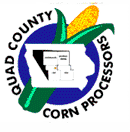DuPont Industrial Biosciences will continue to supply the enzymes that enable Quad County Corn Processors’ (QCCP) Cellerate process in the production of cellulosic biofuel from corn kernel fiber. The ethanol plant developed the process and was the first in the country to produce cellulosic ethanol gallons from the corn kernel fiber. QCCP uses DuPont  OPTIMASH suite of enzymes from the DuPont Accellerase portfolio of cellulosic enzymes. The OPTIMASH enzymes are specifically formulated for use in the corn fiber cellulosic application.
OPTIMASH suite of enzymes from the DuPont Accellerase portfolio of cellulosic enzymes. The OPTIMASH enzymes are specifically formulated for use in the corn fiber cellulosic application.
The process was developed using DuPont’s enzymes. Over the last year of production, QCCP Chief Engineer Travis Brotherson has seen a marked difference in value between DuPont’s enzymes and its competitors’ offering. “DuPont’s enzymes have consistently outperformed other products in driving cellulosic ethanol and corn oil yield in our Cellerate process,” said Brotherson.
 QCCP currently produces 2 million gallons of biofuel per year from cellulose conversion, but anticipates production of an additional 2 million gallons of biofuel per year once a C5 yeast is approved. The benefits of adding second-generation biofuel production to an existing dry grind ethanol facility are substantial – from additional ethanol, Cellulosic RINs1 to additional distiller’s corn oil. QCCP further estimates that their technology has the potential to enable grain ethanol plants in the United States to produce over 1 billion gallons of cellulosic ethanol annually based on total corn kernel fiber conversion in the dry grind industry.
QCCP currently produces 2 million gallons of biofuel per year from cellulose conversion, but anticipates production of an additional 2 million gallons of biofuel per year once a C5 yeast is approved. The benefits of adding second-generation biofuel production to an existing dry grind ethanol facility are substantial – from additional ethanol, Cellulosic RINs1 to additional distiller’s corn oil. QCCP further estimates that their technology has the potential to enable grain ethanol plants in the United States to produce over 1 billion gallons of cellulosic ethanol annually based on total corn kernel fiber conversion in the dry grind industry.
“DuPont’s goal is to enable the bioeconomy through science,” said Jan Koninckx, global business director for advanced biofuel at DuPont. “To reach that goal, we offer multiple solutions, from our full advanced biofuels technology licensing to delivering customized solutions in both enzyme technology and co-product production for ethanol producers. We’re proud to be a partner with QCCP, enabling the growth and success of advanced biofuels here in the United States.”
DuPont is commissioning its cellulosic biofuel facility in Nevada on October 30, 2015. The plant is fueled by corn stover and will produce 30 millions gallons of cellulosic ethanol per year.

